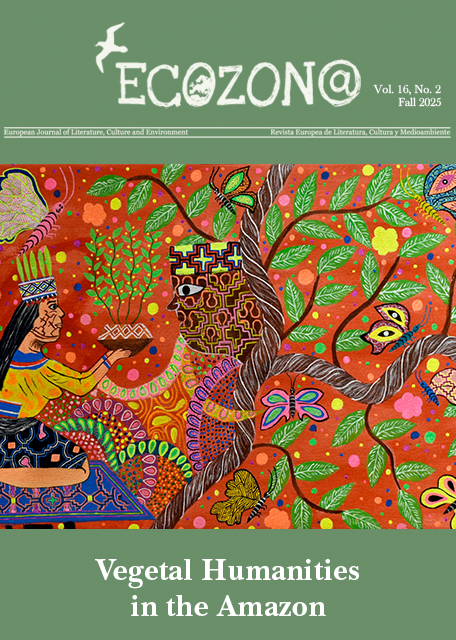Seeing the World Through Glass: Time and Extinction in Fiona Tan’s "Depot" (2015)
DOI:
https://doi.org/10.37536/ECOZONA.2023.14.2.5074Schlagworte:
cinema, time, extinction, video installation, ocean imaginary, natural history museum, Depot, non-linearity, decolonisationAbstract
These times of mass extinctions ask for different temporalities than rationalized, linear time, to become in synch with them. Depot (2015) is a film installation by Indonesian-Australian artist Fiona Tan showcasing endangered and extinct marine animals that are preserved in jars, taxidermied or parts of skeletons in the natural history museums of Leiden and Berlin. I argue that through cinematic techniques such as stilled images, (extreme) close-ups, framing and a poetic voice-over recounting memories of marine animals, these specimens are given duration. Through this, Depot scrutinizes narratives of Western science and imperialism tied to linear time and progress perpetuated by natural history museums. The scientific and objective status of the natural history museum and its extraction histories is not only criticized, but its histories are also acknowledged, lamented and reframed. As such, Depot offers a decolonising extinction temporality as well as a new ocean imaginary that opposes ideas of ocean life as abundant frontier. I argue that Depot questions the mechanisms of science and time that determine how we see ourselves as humans and our place in the nonhuman world.
Downloads
Downloads
Veröffentlicht
Ausgabe
Rubrik
Lizenz
Authors who publish with this journal agree to the following terms:
a) Authors retain copyright and grant the journal right of first publication with the work simultaneously licensed under a Creative Commons Attribution License that allows others to share the work with an acknowledgement of the work's authorship and initial publication in this journal (CC BY-NC for articles and CC BY-NC-ND for creative work, unless author requests otherwise.
b) Authors are able to enter into separate, additional contractual arrangements for the non-exclusive distribution of the journal's published version of the work (e.g., post it to an institutional repository or publish it in a book), with an acknowledgement of its initial publication in this journal.
c) Authors are permitted and encouraged to post their work online (e.g., in institutional repositories or on their website) prior to and during the submission process, as it can lead to productive exchanges, as well as earlier and greater citation of published work (See The Effect of Open Access).










